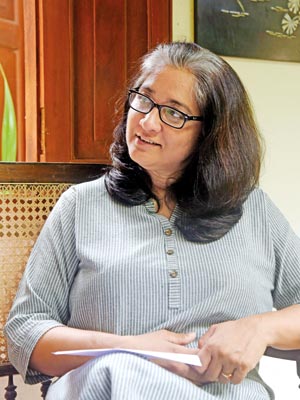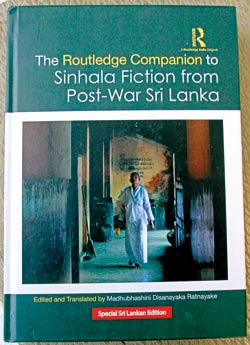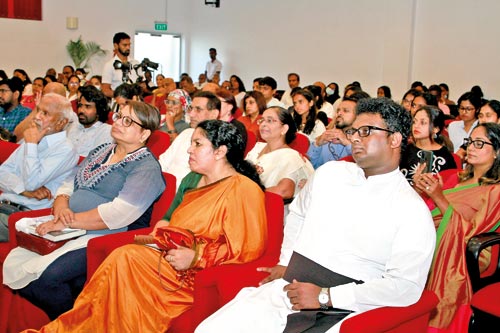A literary path to healing

Madhubhashini Disanayaka-Ratnayake. Pic by Akila Jayawardena
The Routledge Companion to Sinhala Fiction from Post-War Sri Lanka is not coloured in the carmines, purples and blacks of a paradise blighted. If it has trauma, it is not hateful but comes as a stand against exclusivist nationalism.
The stories were chosen because all of them are post-war, and manifested resistance to the divisive forces trying to rend people apart – a controlled and fair look at what happened during the 30 years of conflict that blighted the country.
Translator and editor of this hefty volume, Dr Madhubhashini Disanayaka-Ratnayake spent five years on the monumental task.
Madhubhashini, a lecturer at the English Language Teaching Department at the Sri Jayawardenepura University, not only had to render into English 28 short stories and extracts from novels by 14 writers but also to weather the world of international publishing to successfully realise this smart Routledge companion.
Madhubhashini was brought up in a bilingual ménage, daughter of Prof J.B. Disanayaka, emeritus professor of Sinhala, Colombo University. As a girl at Ladies’ College, she was ‘mostly in the library’ where a love for reading was fostered under the free-spirited Sirancee Gunewardene, principal, and librarian Miss Nimala.
Today a leading academic with her first degree from the University of Allahabad and a Masters in American and English Literature at the New York University, Madhubhashini is also a Gratiaen-winning author. She is married to the classical sitarist Pradeep Ratnayake and has two daughters.
The book was born in the throes of her interdisciplinary (anthropology and English) PhD for which she was researching on post-war literature. Part of the translated texts were then submitted to the oeuvre gathered for the 60th anniversary celebrations of the Sri Jayawar-denepura University.
When the collection was being prepared to be published locally, she requested Dr Sasanka Perera, well known anthropologist at the South Asian University, to write the foreword. It was at his suggestion and aegis that she was ushered into the world of big Western publishers.
While they applied to Routledge, Bloomsbury and Orient Blackswan with Dr Sasanka’s backing, both Routledge and Orient accepted it and Routledge was chosen.
 There were nine writers when Madhubhashini was given a grant for what she presented to her university but after the Routledge acceptance, she wanted five more added. So while with the university grant she could pay the first nine authors the remaining five (and Madhubhashini herself) have to wait till her royalties for the book arrive.
There were nine writers when Madhubhashini was given a grant for what she presented to her university but after the Routledge acceptance, she wanted five more added. So while with the university grant she could pay the first nine authors the remaining five (and Madhubhashini herself) have to wait till her royalties for the book arrive.
The 14 writers were cherry-picked; from the oldest, Ajit Tilakasena (born before Independence) to the youngest, Kaushalya Kumarasinghe (born two years before the war began) because all bar Kaushalya and Kathyana Amarasinghe were national award winners (these two, youngest in the group, however have been shortlisted).
Madhubhashini is the first person to acknowledge that the Sinhala writers are “light years ahead” of “those of us who write in English” given the former spring from a deep tradition and have a wider readership.
The challenges faced by the literary translator did not spare Madhubhashini and she says these were basically twofold.
The linguistic difficulties were with certain Sinhala words steeped in a culture of paddy field, wewa, dageba and temple. For example, “how to translate kiri wedunu goyam?” – an evocative term for ripe paddy.
While there are footnotes, not everything is explained tidily. Madhubhashini has turned tables on the tradition where all things local needed to be italicized and glossed over whereas western concepts would be assumed to be known by any reader.
Words like dageba were left intact. (Hasn’t Google given ease of access to even the most esoteric of our oriental cultures?)
There was also the emotional difficulty of rendering what were highly traumatic stories – “living through the pain again”. The story Ekama Putha (The Only Son) with its tragedy and injustice “nearly killed me” says the gentle writer.
“When it comes to the war, there’s an eternal question: should we remember or should we forget? So if you look at The Buried Giant by Kazuo Ishiguro the whole thing is ‘should we cover the path or remember it?’”

A section of the audience at the book launch at the BCIS auditorium, BMICH. Pic by Priyanka Samaraweera
She thinks we should remember because otherwise we will repeat the same mistakes. “But remember not so that we hold on to the anger; remember so that we come to a point where we say ‘this happened – it should never happen again’.”
She stresses the stories are not against nationalism or patriotism. All these writers absolutely love their country and it is terrorism they lash out at – ‘wherever it came from’.
“For me (such) resistance is one of the biggest hopes I have,” says Madhubhashini. It is the beginning of the healing process.
Finally a remark about the stunning yet subtle appositeness in the beautiful cover image of the book: a strangely calm, sedate prison or a hospital where corridors of graffiti with a shaven-headed woman in white sil andhum and plastic cup speak not only of the regret, but also redemption; healing – and finally peace.
The book priced at Rs. 6700 is distributed by Sarasavi Publishers.
Searching for an ideal partner? Find your soul mate on Hitad.lk, Sri Lanka's favourite marriage proposals page. With Hitad.lk matrimonial advertisements you have access to thousands of ads from potential suitors who are looking for someone just like you.


